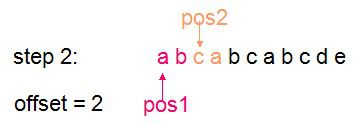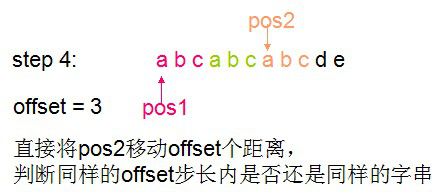求一个字符串中连续出现次数最多的子串
把字符串用后缀树的形式表现出来如下:
a b c a b c a b c d e .substr[0]
b c a b c a b c d e ....substr[1]
c a b c a b c d e .......substr[2]
a b c a b c d e ..........substr[3]
b c a b c d e .............substr[4]
c a b c d e ...............substr[5]
a b c d e .................substr[6]
b c d e ...................substr[7]
c d e .....................substr[8]
d e ........................substr[9]
e ..........................substr[10]
可以观察到,若存在连续出现的字串,则满足 substr[0].substr(i,j-i) == substr[j].substr(0,j-i),例如上例中的
substr[0].substr(0,3-0) == substr[3].substr(0,3-0)
我们换一种方式来看,不需要生成后缀组,但思想还是一样的。




代码:
代码中str.substr(pos2,offset)其实相当于后缀组的substr[pos2].substr(0,offset)
把字符串写成后缀组其实相当于站在不同的位置往后看这个数组,所以其实并不需要额外增加存储空间来生成后缀组。
#include <iostream> #include <string> using namespace std; void main(){ string str = "abcabcabcccccdefefefefefef"; int len = str.length(); int maxCount = 0; string longest = ""; for(int pos1 = 0; pos1 < len; pos1++) for(int pos2 = pos1 + 1; pos2 < len; pos2++){ if(str.substr(pos1,pos2-pos1) == str.substr(pos2,pos2-pos1)){ int offset = pos2-pos1; int count = 2; for(int k = pos2 + offset; k <= len; k += offset){ if(str.substr(pos1,offset) == str.substr(k,offset)){ count += 1; }else{ break; } } if(count > maxCount){ maxCount = count; longest = str.substr(pos1,offset); } } } cout << longest << "," << maxCount << endl; }